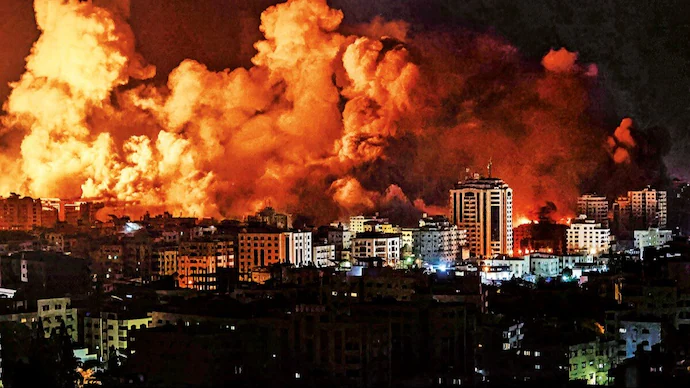Whenever you open your social media platforms or newsletters, you may come across disturbing images of injured or even deceased innocent people, mainly women and children. Over the past two years, these images have been coming from Ukraine. However, as the war in Ukraine shows no signs of ending, the world is now grappling with another conflict, this time in West Asia.
It all started with Hamas, an Islamist terrorist organization and de facto authority in the Palestinian territory of Gaza, launching thousands of missiles on the State of Israel and carrying out subsequent violent incursions in the southern border. This shocking terrorist attack, which Hamas called ‘Operation Al-Aqsa Flood,’ resulted in hundreds of deaths and kidnappings of ordinary Israeli citizens.
In response, Israel declared war on Hamas, launching a relentless campaign of airstrikes in Gaza, accompanied by an intense ground offensive to eliminate Hamas hideouts.
Hamas militants stormed southern Israel, killing around 1,400 people and taking more than 230 hostages, as reported by Israel’s Foreign Ministry. In response, Israel’s offensive in Gaza resulted in more than 11,100 civilian casualties, with women and children bearing the brunt on both sides.
Neither side seems willing to end the conflict. Israel’s forces are determined to wipe out Hamas hideouts in Gaza, and Hamas persists with resource support from various groups and nations. Given its geopolitical significance, the conflict has attracted numerous international players. The world stands sharply divided on the issue. Some condemn Hamas’s terror attacks and support Israel’s aggressive response, while others selectively blame Israel, accusing it of Palestinian genocide and downplaying Hamas violence in Israel.
While Western governments stand in support of Israel and the Muslim Ummah expresses solidarity with the Palestinians, amidst growing divisions, the international community has failed to find common ground to broker a peace deal.
While others are engaged in ‘either with us or against us’ rhetoric, India is walking its independent path, rejecting selective criticism and condemning violence in its entirety. Instead of picking sides blindly, it stands independently, calling for an immediate end to violence from both parties and working toward conditions for direct peace talks.
However, India’s position came under scrutiny when Prime Minister Modi tweeted after the Hamas attack, condemning it and expressing solidarity with Israel in its fight against terrorism. Critics viewed this as a departure from the traditional “moral” position of supporting the Palestinian plight.
Moreover, India’s abstention from a UN resolution, which called for an “immediate, durable, and sustained humanitarian truce” between Israeli forces and Hamas in Gaza, was perceived as support for Israel’s ground offensive and anti-Palestinian policy.
This viewpoint gains backing from some political and civil society leaders within and outside India. Let’s break down New Delhi’s position on the conflict with two key questions:
First, is India shifting from its traditional Palestine policy? Second, is India’s stance aligning with international moral and legal standards?
India has been a steadfast supporter of the Palestinian cause and in solidarity with the Palestinian people since the time of its first prime minister, Jawaharlal Nehru. In 1947, India voted against the partition of Palestine at the UN General Assembly. Notably, India was the first non-Arab country to recognize the Palestine Liberation Organization (PLO) as the sole and legitimate representative of the Palestinian people in 1974. Furthermore, India was among the pioneers in recognizing the State of Palestine in 1988.
Throughout, India has remained a strong advocate of the two-nation solution and has favored the creation of a “sovereign, independent, united” State of Palestine.
In 2017, under Modi’s leadership, India experienced a notable shift in its policy toward Israel and Palestine, transitioning from ambiguity to a clear stance of “de-hyphenation” in both relationships. Despite this policy change and the growing strategic proximity with Israel, India consistently upheld its firm support for the Palestinian cause in various global forums, maintaining solidarity with the Palestinian people.
However, unlike many other countries, India refused to provide “unconditional” support to Palestine and condemned the acts of terrorism by Hamas. Aligned with its global anti-terrorism policy, India abstained from the UN Resolution, stating that any resolution for peace must condemn Hamas’s terrorist attack against Israel, which was not addressed in the resolution. On the other hand, India supported a UN resolution condemning Israeli settlements in the Occupied Palestinian Territory, showcasing its commitment to the Palestinian right to self-realization despite strong ties with Israel.
Secondly, India stands out with its unique neutral stance, consistently advocating for peaceful resolutions rather than diving into conflicts, be it the Ukraine war or the ongoing Israel-Hamas conflict. In both conflicts, India stood out as one of the few countries condemning aggression from all sides, advocating for dialogue on common ground. New Delhi’s strategy is straightforward – a delicate balance between “moral correctness” and “political correctness.” India actively champions humanitarian principles, global peace, and justice, all while considering the geoeconomic consequences on the already scrambling global economy.
India has been advocating for regional and international discussions centered on the rejection of global terrorism, and promoting diplomacy, dialogue, and relief aid for the ongoing humanitarian crisis. PM Modi has reached out to many leaders, expressing deep concern about terrorism, violence, and the deteriorating security situation in the region.
However, with the region’s growing strategic importance for India’s economic and geopolitical interests, it’s time for India to step up and play a more assertive role in resolving the conflict. With the world already facing the economic repercussions of the Ukraine war, this conflict could heighten global energy security concerns, particularly impacting India’s energy security. Furthermore, ensuring security and stability in the region is vital for India’s geopolitical and geoeconomic ambitions in West Asia.
The recently announced India-Middle East-Europe Economic Corridor (IMEC) on the sidelines of the G20 meeting in New Delhi could indeed serve as India’s flagship global initiative. However, the Israel-Hamas conflict may pose a hindrance to its realization.
China, India’s geopolitical rival, is striving to be the “new best buddy of the Islamic world.” Teaming up with Moscow, Beijing is championing the narrative of West vs Rest, positioning itself as a global alternative to the United States.
India can leverage the already well-established I2U2 setup to advocate for regional dialogue, working towards a lasting truce between both sides. Key Arab powers, such as Saudi Arabia, UAE, and Egypt, have already signaled a policy shift, preventing this conflict from escalating into a new chapter in the Arab-Israeli conflict. As a strategic partner to all involved, India has the opportunity not only to push for a resolution of the ongoing conflict but also to establish a broader framework to prevent future wars, including the involvement of the PLO in the process.
As India aspires to become a great power, it must assert its role as a global peacemaker and lead international efforts to find a lasting solution to this conflict.






